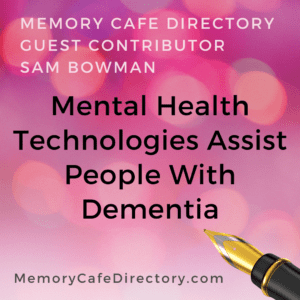Memory Cafe Directory posts and/or links to retailers can be advertising, sponsored, or affiliate links. We may earn a small commission from them. Thank you.
According to the Population Reference Bureau (PRB), the number of Americans with dementia is increasing. This is likely due to the Baby Boomer generation getting older. In 2020, over 7 million people over the age of 65 had dementia.
It’s a difficult disease to live with, and can be equally heartbreaking for family members and friends. But, technology is making a difference for people living with dementia and healthcare providers who are trying to help those people.
There’s no question that technology has had a major impact on the healthcare industry over the last decade – including mental health advancements. Those advancements are making life easier for people living with dementia, and in some cases, increasing their independence while improving their quality of life.
Let’s take a closer look at various tech tools and advancements that are designed to assist people living with this condition. If you or someone you love has been diagnosed with dementia, some of these resources might be able to help. While there is still no cure for dementia, being able to live a full and happy life for as long as possible is a major step forward.
Digitalization and Accessibility
The digitalization of society has become an equalizer for those living with disabilities and even people in underserved communities. When it comes to people living with dementia, digital technologies have leveled the playing field by making it easier to live independently for as long as possible.
For example, smart home technology and IoT (Internet of Things) devices make it easy to establish a routine, set reminders for things, and experience alerts when you’ve missed a medication or if you’re in need of assistance.
Things like in-home cameras, communication aids, and location devices can ensure you stay safe by connecting to your caretakers and alerting them if something goes wrong.
Telehealth has also improved mental health care across the globe. It’s not uncommon for people with dementia to be diagnosed with depression – especially in the early stages of the disease. Being able to talk to a mental health professional from the comfort of your home is a game changer for those living with dementia who might not be able to leave the house on their own.
Additionally, tech advancements have made it possible for people to continue their education, keep their minds working, and even keep track of their finances with a few strokes of a keyboard or clicks of a mouse.
For someone with dementia, or even a care partner, that makes it easier to keep things organized, stay safe, and keep moving forward as much as possible without having to leave the home.
Better Access to Care
One of the biggest challenges individuals living with dementia face is equal access to care, especially when they live in rural areas. Rural living comes with unique health concerns, including difficulties with securing health insurance and accessing healthcare. This means dealing with any mental or physical ailment can pose a challenge, particularly for those living with dementia.
With dementia, it can be difficult to leave the house, drive, or make appointments without a caregiver to handle things for you. Your access to quality healthcare is more likely to be limited, and it might be difficult to find a professional who specializes in your condition anywhere nearby.
Thankfully, technology has helped to bridge the gap. We touched on telehealth above, but it’s worth noting what a game-changer it is for those who might otherwise not have access to the care they need and deserve. In addition to being able to talk to doctors, therapists, and counselors, technology has made it possible for caregivers and loved ones to check in more frequently.
Even casual, friendly conversations with family and friends are easier for those with dementia today than it was even ten years ago. A phone conversation is certainly better than nothing. But today, you can host a video call with one person or ten people at once. If you know someone with dementia, scheduling regular “family meetings” with them online can be a great way to check on their well-being while helping them deal with feelings of isolation and loneliness.
Online Memory Cafes
One benefit of technology in recent years is the growth of virtual Memory Cafes. Memory Cafes are dementia-friendly events designed for the person living with dementia along with their care partner to enjoy together. In addition to in person Memory Cafes, virtual Memory Cafes can be attended from anywhere.
A More Comfortable, Stress-Free Life
According to the Alzheimer’s Society, people with dementia are often at a greater risk of developing depression. Therefore, it’s important to make sure their lives are as stress-free as possible. If you’re a caregiver, one of the best ways to do that is by investing in smart home technology.
Little things like smart thermostats, refrigerators, and other appliances can be easily installed in the home of a person with dementia. You can set them up to be monitored and controlled from your mobile device. Not only does it ensure that you can keep that individual safe and comfortable, but you’ll know that they don’t have to remember to keep track of those things on their own.
Smart appliances can even make it easier for those with dementia to make meals safely, wash clothes without worrying about forgetting them, or even listen to music just by saying the name of a song or artist out loud. Music is a wonderful, powerful healing tool for those with dementia, and can bring them a lot of joy.
Again, there is unfortunately, no cure for dementia today. Some people struggle with the effects of the disease faster than others. But the goal for both patients and caregivers should always be to maintain a positive quality of life for as long as possible. That includes prioritizing mental health and well-being.
Thankfully, that’s easier to do today than ever before, largely thanks to advancements in technology. From improved communication to IoT device monitoring, and even from smart home technology to greater access to care, today’s dementia community has a better chance of maintaining their mental health and fighting back against the condition.
If you or someone you know is dealing with the early stages of dementia, it’s not too late to take advantage of these tech resources. You might be surprised by how much of a difference they make in the life of a person living with dementia, as well as their family and friends.
About the Author
Sam Bowman

Sam Bowman
Sam writes about people, health, wellness, and how they merge. He enjoys getting to utilize the internet for a community without actually having to leave his house.
In his spare time he likes running, reading, and combining the two in a run to his local bookstore.”
Connect with Sam on LinkedIn.
Become a Contributor!
 Do you want to be a Memory Cafe Directory contributor? If you have helpful information to share with our community, read about the guidelines, then get in touch to discuss what you have to offer.
Do you want to be a Memory Cafe Directory contributor? If you have helpful information to share with our community, read about the guidelines, then get in touch to discuss what you have to offer.
Thank you.






